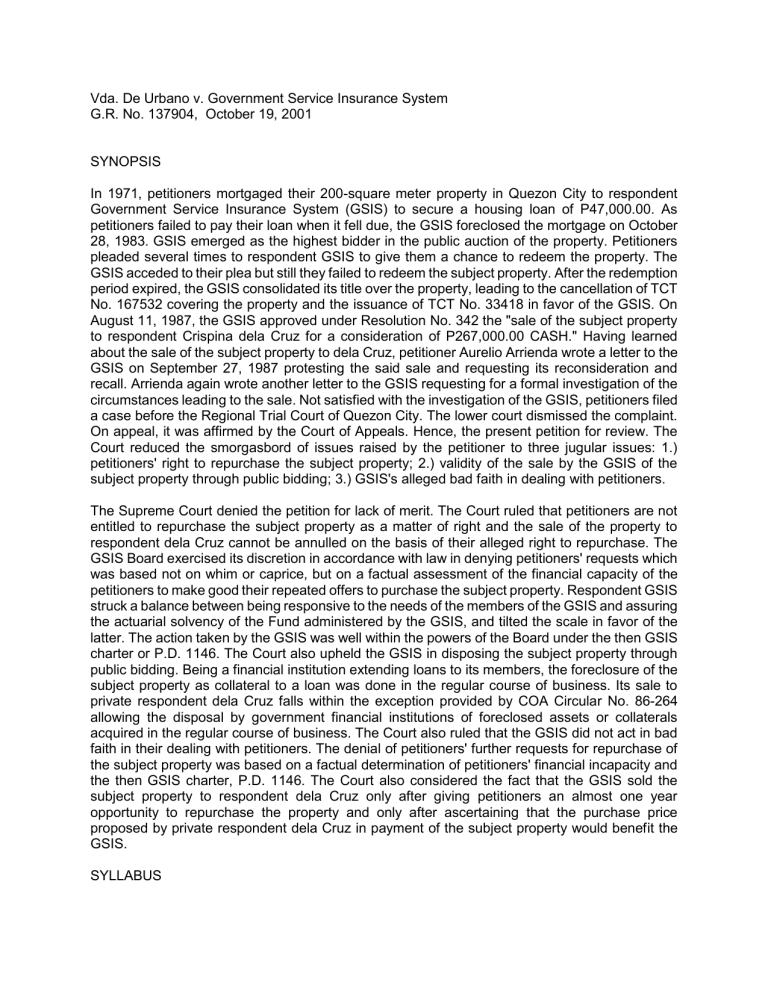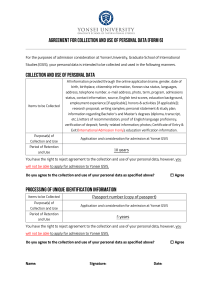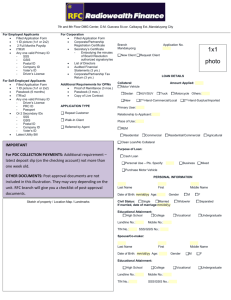
Vda. De Urbano v. Government Service Insurance System G.R. No. 137904, October 19, 2001 SYNOPSIS In 1971, petitioners mortgaged their 200-square meter property in Quezon City to respondent Government Service Insurance System (GSIS) to secure a housing loan of P47,000.00. As petitioners failed to pay their loan when it fell due, the GSIS foreclosed the mortgage on October 28, 1983. GSIS emerged as the highest bidder in the public auction of the property. Petitioners pleaded several times to respondent GSIS to give them a chance to redeem the property. The GSIS acceded to their plea but still they failed to redeem the subject property. After the redemption period expired, the GSIS consolidated its title over the property, leading to the cancellation of TCT No. 167532 covering the property and the issuance of TCT No. 33418 in favor of the GSIS. On August 11, 1987, the GSIS approved under Resolution No. 342 the "sale of the subject property to respondent Crispina dela Cruz for a consideration of P267,000.00 CASH." Having learned about the sale of the subject property to dela Cruz, petitioner Aurelio Arrienda wrote a letter to the GSIS on September 27, 1987 protesting the said sale and requesting its reconsideration and recall. Arrienda again wrote another letter to the GSIS requesting for a formal investigation of the circumstances leading to the sale. Not satisfied with the investigation of the GSIS, petitioners filed a case before the Regional Trial Court of Quezon City. The lower court dismissed the complaint. On appeal, it was affirmed by the Court of Appeals. Hence, the present petition for review. The Court reduced the smorgasbord of issues raised by the petitioner to three jugular issues: 1.) petitioners' right to repurchase the subject property; 2.) validity of the sale by the GSIS of the subject property through public bidding; 3.) GSIS's alleged bad faith in dealing with petitioners. The Supreme Court denied the petition for lack of merit. The Court ruled that petitioners are not entitled to repurchase the subject property as a matter of right and the sale of the property to respondent dela Cruz cannot be annulled on the basis of their alleged right to repurchase. The GSIS Board exercised its discretion in accordance with law in denying petitioners' requests which was based not on whim or caprice, but on a factual assessment of the financial capacity of the petitioners to make good their repeated offers to purchase the subject property. Respondent GSIS struck a balance between being responsive to the needs of the members of the GSIS and assuring the actuarial solvency of the Fund administered by the GSIS, and tilted the scale in favor of the latter. The action taken by the GSIS was well within the powers of the Board under the then GSIS charter or P.D. 1146. The Court also upheld the GSIS in disposing the subject property through public bidding. Being a financial institution extending loans to its members, the foreclosure of the subject property as collateral to a loan was done in the regular course of business. Its sale to private respondent dela Cruz falls within the exception provided by COA Circular No. 86-264 allowing the disposal by government financial institutions of foreclosed assets or collaterals acquired in the regular course of business. The Court also ruled that the GSIS did not act in bad faith in their dealing with petitioners. The denial of petitioners' further requests for repurchase of the subject property was based on a factual determination of petitioners' financial incapacity and the then GSIS charter, P.D. 1146. The Court also considered the fact that the GSIS sold the subject property to respondent dela Cruz only after giving petitioners an almost one year opportunity to repurchase the property and only after ascertaining that the purchase price proposed by private respondent dela Cruz in payment of the subject property would benefit the GSIS. SYLLABUS 1. LABOR AND SOCIAL LEGISLATION; GOVERNMENT SERVICE INSURANCE SYSTEM; SECTION 79 OF THE AUDITING CODE OF THE PHILIPPINES (P.D. 1445) IS NOT APPLICABLE IN CASE AT BAR AS THE SAID PROVISION APPLIES ONLY TO UNSERVICEABLE PROPERTY. — Section 79 of P.D. 1445 does not apply to the case at bar as this provision applies only to unserviceable property. That the subject property is not "unserviceable" or useless is rather obvious. Petitioners are precisely fighting tooth and nail to claim the subject property as they are still using it as their family home. It still serves its purpose well. Neither is it "no longer needed" by the GSIS. As a financial institution extending housing loans, the disposition of foreclosed properties — such as the subject property — at a price beneficial to the GSIS helps maintain the actuarial solvency of the GSIS fund. It cannot therefore be said that the subject property is "no longer needed" by the GSIS. 2. CONSTITUTIONAL LAW; COMMISSION ON AUDIT; THE EXCEPTION PROVIDED IN COMMISSION ON AUDIT CIRCULAR NO. 86-264 SHOULD BE, TO THE WIDEST EXTENT POSSIBLE, CONSTRUED TO ALLOW GOVERNMENT-OWNED AND CONTROLLED CORPORATIONS WIDE LATITUDE IN THE DISPOSITION OF ASSETS, INCLUDING FORECLOSED ASSETS OR COLLATERALS ACQUIRED IN THE REGULAR COURSE OF BUSINESS. — The pivotal question is whether the subject property is covered by COA Circular 86-264 or falls under the exception in its paragraph 5 of COA Circular 89-296. In C&C Commercial Corporation v. National Waterworks and Sewerage Authority, we ruled that statutes in pari materia should be construed together to attain the purpose of an expressed national policy, viz: "On the presumption that whenever the legislature enacts a provision it has in mind the previous statutes relating to the same subject matter, it is held that in the absence of any express repeal or amendment therein, the new provision was enacted in accord with the legislative policy embodied in those prior statutes, and they all should be construed together. Provisions in an act which are omitted in another act relating to the same subject matter will be applied in a proceeding under the other act, when not inconsistent with its purpose. Prior statutes relating to the same subject matter are to be compared with the new provisions; and if possible by reasonable construction, both are to be construed that effect is given to every provision of each. Statutes in pari materia, although in apparent conflict, are so far as reasonably possible construed to be in harmony with each other." The laws on GOCC's and disposition of their assets unmistakably show the policy of the government to allow flexibility to GOCC's and to promote disposition of non-performing assets. This policy undergirds both COA Circular No. 86-264 and 89-296. Thus, the exception provided in COA Circular No. 86-264 should be, to the widest extent possible, construed to accommodate this policy and allow GOCC's wide latitude in the disposition of their assets, including foreclosed assets or collaterals acquired in the regular course of business. COA Circular No. 89-296 provides for two exceptions to the requirement of disposition primarily through public bidding, i.e., (1) disposal of merchandise or inventory held for sale in the regular course of business; and (2) disposal by government financial institutions of foreclosed assets or collaterals acquired in the regular course of business." In light of the declared policy of the government on GOCC's and their assets, COA Circular No. 89-296 should be understood to have clarified the coverage of the exception under COA Circular No. 86-264, i.e., sales of merchandise/inventory held for sale in the regular course of business. 3. LABOR LEGISLATION; GOVERNMENT SERVICE INSURANCE SYSTEM; THE SALE OF THE SUBJECT PROPERTY TO RESPONDENT FALLS WITHIN THE EXCEPTION PROVIDED BY COMMISSION ON AUDIT CIRCULAR NO. 80-264 AS CLARIFIED BY CIRCULAR 89-296. — The GSIS being a financial institution extending loans to its members, the foreclosure of the subject property as collateral to a loan was done in the regular course of business. Its sale to private respondent dela Cruz falls within the exception provided by COA Circular No. 86-264 as clarified by COA Circular 89-296, and thus does not offend the requirements of the said COA circulars. Instead, the policies and procedures of the GSIS on the disposition of acquired assets govern the case at bar. Mr. Romeo Tejedor, manager of the Acquired Assets Department of GSIS, testified that at the time the disputed transaction took place, the GSIS still did not have clear cut policies on the sale of acquired assets. At that time, the GSIS Board of Trustees had the prerogative to authorize the sale of acquired assets. Petitioners aver that the GSIS "Policy and Procedural Guidelines Acquisition, Administration, and Disposition of Acquired Assets (PPG)," a newspaper copy of which they annexed to their reply to the GSIS' brief, provides that a negotiated sale may only be entered into after two failed public biddings on the acquired property. Petitioners, however, omitted to state that the said newspaper copy was published and the PPG took effect only on January 17, 1991, long after the sale of the subject property. In the absence of evidence of policies and procedures contrary to the testimony of Mr. Tejedor, we give credence to Mr. Tejedor's testimony that at the time of the disputed sale to private respondent dela Cruz, GSIS did not have clear cut policies on disposition of assets that required it to first sell the subject property through public bidding before a negotiated sale. The GSIS precisely came out with a PPG in 1991 to set the policies and procedures to govern the disposition of acquired assets because these were not clear cut prior to 1991. We therefore hold that the sale of the subject property to private respondent dela Cruz was not contrary to law. 4. CONSTITUTIONAL LAW; RIGHT TO INFORMATION; LIMITED TO "MATTERS OF PUBLIC CONCERN" AND "TRANSACTIONS INVOLVING PUBLIC INTEREST"; THE NEGOTIATION AND SALE OF THE SUBJECT PROPERTY TO PRIVATE RESPONDENT WAS BY NO STRETCH OF IMAGINATION IMBUED WITH PUBLIC INTEREST AS IT WAS PURELY A PRIVATE TRANSACTION. — On the issue of whether or not GSIS was in bad faith in dealing with the petitioners, we rule in the negative. As earlier discussed, respondent GSIS' denial of petitioners' further requests for repurchase of the subject property was based on a factual determination of petitioners' financial incapacity and the then GSIS charter, P.D. 1146. It is also worth noting that GSIS sold the subject property to respondent dela Cruz only after giving petitioners an almost one year opportunity to repurchase the property and only after ascertaining that the purchase price proposed by private respondent dela Cruz in payment of the subject property would benefit the GSIS. Nor can petitioners, on the strength of Valmonte v. Belmonte, Jr., impute bad faith on the part of GSIS when the latter did not disclose to petitioners that it was negotiating with private respondent dela Cruz for the sale of the subject property as soon as it started the negotiations. The Court ruled in the Valmonte case that the constitutional right to information is limited to "matters of public concern," to "transactions involving public interest." The negotiation and subsequent sale of the subject property by the GSIS to private respondent dela Cruz was by no stretch of the imagination imbued with public interest as it was a purely private transaction. Petitioners cannot therefore demand that it be informed of such negotiation and sale more so since they no longer had any interest on the subject property upon failure to comply with GSIS' terms for repurchase and upon GSIS' denial of petitioners' offer to repurchase under their proposed terms and conditions. JG Summit Holdings, Inc. v. Court of Appeals G.R. No. 124293, September 24, 2003 III. Whether the right to top granted to KAWASAKI in exchange for its right of first refusal violates the principles of competitive bidding. We also hold that the right to top granted to KAWASAKI and exercised by private respondent did not violate the rules of competitive bidding. The word "bidding" in its comprehensive sense means making an offer or an invitation to prospective contractors whereby the government manifests its intention to make proposals for the purpose of supplies, materials and equipment for official business or public use, or for public works or repair. 38 The three principles of public bidding are: (1) the offer to the public; (2) an opportunity for competition; and (3) a basis for comparison of bids. As long as these three principles are complied with, the public bidding can be considered valid and legal. It is not necessary that the highest bid be automatically accepted. The bidding rules may specify other conditions or the bidding process be subjected to certain reservation or qualification such as when the owner reserves to himself openly at the time of the sale the right to bid upon the property, or openly announces a price below which the property will not be sold. Hence, where the seller reserves the right to refuse to accept any bid made, a binding sale is not consummated between the seller and the bidder until the seller accepts the bid. Furthermore, where a right is reserved in the seller to reject any and all bids received, the owner may exercise the right even after the auctioneer has accepted a bid, and this applies to the auction of public as well as private property. Thus: It is a settled rule that where the invitation to bid contains a reservation for the Government to reject any or all bids, the lowest or the highest bidder, as the case may be, is not entitled to an award as a matter of right for it does not become a ministerial duty of the Government to make such an award. Thus, it has been held that where the right to reject is so reserved, the lowest bid or any bid for that matter may be rejected on a mere technicality, that all bids may be rejected, even if arbitrarily and unwisely, or under a mistake, and that in the exercise of a sound discretion, the award may be made to another than the lowest bidder. And so, where the Government as advertiser, availing itself of that right, makes its choice in rejecting any or all bids, the losing bidder has no cause to complain nor right to dispute that choice, unless an unfairness or injustice is shown. Accordingly, he has no ground of action to compel the Government to award the contract in his favor, nor compel it to accept his bid. In the instant case, the sale of the Government shares in PHILSECO was publicly known. All interested bidders were welcomed. The basis for comparing the bids were laid down. All bids were accepted sealed and were opened and read in the presence of the COA's official representative and before all interested bidders. The only question that remains is whether or not the existence of KAWASAKI's right to top destroys the essence of competitive bidding so as to say that the bidders did not have an opportunity for competition. We hold that it does not. The essence of competition in public bidding is that the bidders are placed on equal footing. This means that all qualified bidders have an equal chance of winning the auction through their bids. In the case at bar, all of the bidders were exposed to the same risk and were subjected to the same condition, i.e., the existence of KAWASAKI's right to top. Under the ASBR, the Government expressly reserved the right to reject any or all bids, and manifested its intention not to accept the highest bid should KAWASAKI decide to exercise its right to top under the ABSR. This reservation or qualification was made known to the bidders in a pre-bidding conference held on September 28, 1993. They all expressly accepted this condition in writing without any qualification. Furthermore, when the Committee on Privatization notified petitioner of the approval of the sale of the National Government shares of stock in PHILSECO, it specifically stated that such approval was subject to the right of KAWASAKI Heavy Industries, Inc./Philyards Holdings, Inc. to top JGSMI's bid by 5% as specified in the bidding rules. Clearly, the approval of the sale was a conditional one. Since Philyards eventually exercised its right to top petitioner's bid by 5%, the sale was not consummated. Parenthetically, it cannot be argued that the existence of the right to top "set for naught the entire public bidding." Had Philyards Holdings, Inc. failed or refused to exercise its right to top, the sale between the petitioner and the National Government would have been consummated. In like manner, the existence of the right to top cannot be likened to a second bidding, which is countenanced, except when there is failure to bid as when there is only one bidder or none at all. A prohibited second bidding presupposes that based on the terms and conditions of the sale, there is already a highest bidder with the right to demand that the seller accept its bid. In the instant case, the highest bidder was well aware that the acceptance of its bid was conditioned upon the non-exercise of the right to top. To be sure, respondents did not circumvent the requirements for bidding by granting KAWASAKI, a non-bidder, the right to top the highest bidder. The fact that KAWASAKI's nominee to exercise the right to top has among its stockholders some losing bidders cannot also be deemed "unfair." It must be emphasized that none of the parties questions the existence of KAWASAKI's right of first refusal, which is concededly the basis for the grant of the right to top. Under KAWASAKI's right of first refusal, the National Government is under the obligation to give preferential right to KAWASAKI in the event it decides to sell its shares in PHILSECO. It has to offer to KAWASAKI the shares and give it the option to buy or refuse under the same terms for which it is willing to sell the said shares to third parties. KAWASAKI is not a mere non-bidder. It is a partner in the joint venture; the incidents of which are governed by the law on contracts and on partnership. It is true that properties of the National Government, as a rule, may be sold only after a public bidding is held. Public bidding is the accepted method in arriving at a fair and reasonable price and ensures that overpricing, favoritism and other anomalous practices are eliminated or minimized. But the requirement for public bidding does not negate the exercise of the right of first refusal. In fact, public bidding is an essential first step in the exercise of the right of first refusal because it is only after the public bidding that the terms upon which the Government may be said to be willing to sell its shares to third parties may be known. It is only after the public bidding that the Government will have a basis with which to offer KAWASAKI the option to buy or forego the shares. Assuming that the parties did not swap KAWASAKI's right of first refusal with the right to top, KAWASAKI would have been able to buy the National Government's shares in PHILSECO under the same terms as offered by the highest bidder. Stated otherwise, by exercising its right of first refusal, KAWASAKI could have bought the shares for only P2.03 billion and not the higher amount of P2.1315 billion. There is, thus, no basis in the submission that the right to top unfairly favored KAWASAKI. In fact, with the right to top, KAWASAKI stands to pay higher than it should had it settled with its right of first refusal. The obvious beneficiary of the scheme is the National Government. If at all, the obvious consideration for the exchange of the right of first refusal with the right to top is that KAWASAKI can name a nominee, which it is a shareholder, to exercise the right to top. This is a valid contractual stipulation; the right to top is an assignable right and both parties are aware of the full legal consequences of its exercise. As aforesaid, all bidders were aware of the existence of the right to top, and its possible effects on the result of the public bidding was fully disclosed to them. The petitioner, thus, cannot feign ignorance nor can it be allowed to repudiate its acts and question the proceedings it had fully adhered to. The fact that the losing bidder, Keppel Consortium (composed of Keppel, SM Group, Insular Life Assurance, Mitsui and ICTSI), has joined Philyards in the latter's effort to raise P2.131 billion necessary in exercising the right to top is not contrary to law, public policy or public morals. There is nothing in the ASBR that bars the losing bidders from joining either the winning bidder (should the right to top is not exercised) or KAWASAKI/PHI (should it exercise its right to top as it did), to raise the purchase price. The petitioner did not allege, nor was it shown by competent evidence, that the participation of the losing bidders in the public bidding was done with fraudulent intent. Absent any proof of fraud, the formation by Philyards of a consortium is legitimate in a free enterprise system. The appellate court is thus correct in holding the petitioner estopped from questioning the validity of the transfer of the National Government's shares in PHILSECO to respondent. Finally, no factual basis exists to support the view that the drafting of the ASBR was illegal because no prior approval was given by the COA for it, specifically the provision on the right to top the highest bidder and that the public auction on December 2, 1993 was not witnessed by a COA representative. No evidence was proffered to prove these allegations and the Court cannot make legal conclusions out of mere allegations. Regularity in the performance of official duties is presumed 44 and in the absence of competent evidence to rebut this presumption, this Court is duty bound to uphold this presumption.



